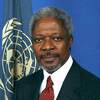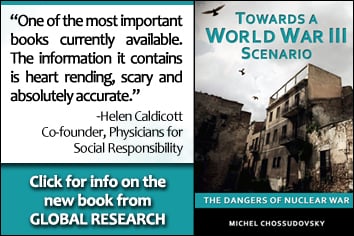Annan Quits as Syria Peace Envoy – the Western Gloves Come Off

Kofi Annan’s resignation as the United Nations’ special envoy to Syria resembles a wounded body being dumped out of a moving car as it recklessly speeds on.
The 74-year-old former UN secretary general was assigned to the conflict-riven Middle East country in April – with the apparent backing of the five permanent members of the Security Council – to implement a six-point peace plan.
But in truth, Annan’s peace plan never stood a chance of succeeding. This was because the US, Britain and France were talking out of both sides of their mouths. While these powers were purportedly endorsing the Annan proposal, they were at the same time stepping up support for the armed mercenaries that have infiltrated Syria since March 2011.
In a comment article published in the Financial Times on Thursday, Annan acknowledges that the Syrian government of President Bashar Al Assad implemented the ceasefire on 12 April, but that “sustained international support did not follow, however. The ceasefire quickly unravelled.” In other words, what the tepid diplomat refrains from saying is that the US and its allies wrecked an opportunity for peace.
Recall that on 1 April, less than two weeks before the Annan ceasefire was supposed to come into effect, the Western powers and their Turk and Gulf Arab allies unveiled a $100 million war chest for the armed opposition groups in their mission to topple the Assad government. Ever since, the quantity and caliber of weapons flowing through Turkey to the Western-backed mercenaries have got heavier and deadlier to the point now where the UN confirms that these groups possess surface-to-air missiles, mortars and even tanks.
Commensurate with the massive funding and weaponry, the legions of foreign fighters entering into Syria have also multiplied. Even the corporate media, which has tried to paint the conflict in Syria with a simplistic “Arab Spring” narrative consisting of a brutal regime pitted against a civilian protest movement, could no longer conceal the burgeoning numbers of jihadists coming from Libya, Iraq, Jordan, Lebanon, Saudi Arabia and even as far away as Pakistan and Chechnya.
It is also openly acknowledged in the Western and Arab media that these groups are affiliated to Al Qaeda and Islamic extremist networks that the Western governments are supposed to be fighting in a “global war on terror”. One report in the British Guardian this week even went as far as praising the Al Qaeda brigades in Syria as being “more effective” militarily than the so-called Free Syrian Army. Squaring the contradiction of NATO supposedly fighting Al Qaeda in Afghanistan while now collaborating, in effect, with the Jihadists in Syria is never explored in the Western mainstream media. Yet this is crucial to understanding why Kofi Annan felt compelled to resign this week, as well as to the bigger understanding of what the Western powers are really getting up to in Syria and the wider world.
Moreover, numerous media reports have also pointed to the involvement of special forces from Britain, France, Turkey and Qatar in the training and directing of the armed groups in Syria. Just this week, it was revealed that US President Barak Obama had months ago signed an executive order for CIA operations to assist anti-Assad forces in that country. This is reminiscent of former President Ronald Reagan bypassing Congress to secretly send the death squads into Nicaragua and Central America during the 1980s.
In addition, Western private “security firms” (also known as professional killers), such as Blackwater (Xe), and Israeli agents, are also known to be operating in Syria.
All the while though, the Western governments maintain the cynical fiction that they are only supplying “non-lethal aid” to Syria. And the Western media – the supposed paragons of free speech and independent thought – shamefully collude in this criminal subterfuge.
Predictably, the intensification of Western, Turk, Arab and Israeli interference in Syria has resulted in a surge of civilian killings, shootings and bombings across the country. And this surge in bloodshed occurred during a time when Western governments were avowedly backing the Annan peace plan.
It is significant that in the weeks before Annan’s assignment as UN and Arab League envoy to Syria, the Syrian authorities appeared to be successful in thwarting the violence to isolated pockets such as Homs and Hama. However, since April, and especially over the past month, the armed groups have been able to expand their campaign of sabotage and terror into the capital Damascus and Syria’s second city, Aleppo. The assassination of the country’s four top security officials in a bomb attack on the capital’s National Security Headquarters on 18 July marked a high point of foreign covert involvement. Government forces now appear stretched to deal with assaults breaking out in every province.
This raises the question as to what was the real purpose of the Annan initiative? Rather than it being a bona fides attempt to negotiate a peaceful solution, it appears that the Western powers and their regional allies were cynically using it as a space to regroup and replenish the armed groups with personnel, arms and logistics to launch a more deadly assault on the Syrian government and society at large.
Commenting on Annan’s resignation, Russia’s deputy foreign minister Gennady Gatilov admitted somewhat darkly: “He’s an honest broker, but there are those who want to take him out of the game to untie hands for the use of force.”
In that way, it would appear that the hapless Annan has served his purpose for the Western powers. He afforded them political cover and space to develop their criminal agenda for regime change. Now it’s time to throw him from the Western vehicle as it moves on to the next and more dangerous phase of its roadmap for Syria.
But Annan’s role appears to have been more insidious than merely that of an ineffective, well-meaning “honest broker”. He was in a position to know full well which governments and parties are fuelling the violence in Syria. He admitted as much in his Financial Times comment quoted above. Yet Annan did not at any time make an unequivocal condemnation of the US, Britain, France, Turkey, Israel, Saudi Arabia or Qatar for what is criminal aggression in Syria. All the while, the diplomat maintained a complicit silence over a grave violation of international law by these powers.
Even with his parting words on the matter, all that Annan would say in the Financial Times was: “For the US, UK, France, Turkey Saudi Arabia and Qatar this means pressing the opposition to embrace a fully inclusive political process – that will include communities and institutions currently associated with the government… It is clear that President Bashar Al Assad must leave office.”
Far from condemning the fuelling of mass murder and mayhem, Assad merely admonishes the Western powers and proxies for not “embracing an inclusive political process”. And he reserves the primary blame for Syria’s destruction for Bashar Al Assad, thus spinning the Western misinformation in his farewell-to-arms valedictory. Dumped from the mobster’s car, the spinning Annan performs one last duty for his masters by bequeathing a distorted picture of the problem in Syria.
Both Washington and London responded to the news of Annan’s departure with sinister logic. The US and Britain blamed Russia and China for the failure of the envoy’s efforts, claiming that they had not put sufficient pressure on their ally in Damascus “to step down”. Significantly, Washington and London said the resignation marked the “failure of diplomacy” and that they would now be seeking an approach outside of the UN Security Council – meaning more “non-lethal” support to the jihadists waging war inside Syria.
With the pretense of diplomacy having floundered on the rocks of Russian and Chinese intransigence, what we can expect now is a dangerous escalation of violence in Syria fuelled by the US, Britain, France and their regional allies. That will of course bring more death and suffering to Syrian civilians, but it also pushes conflict into an international dimension. With violence already spilling over into Lebanon, Turkey and Iraq, a powder keg situation is building that could explode into a war involving Western powers, Iran, Russia and China.
Beijing’s Global Times reported: “On 24 July, ships from the Chinese Fifth Fleet sailed out of the northern exit of the Suez Canal into the Mediterranean.” The Chinese authorities clarified that this mobilization had nothing to do with the situation in Syria.
Meanwhile, a Reuters report on 3 August says that Moscow is sending three large landing ships with a total of 300 marines onboard to its naval facility in the Syrian port of Tartus. The convoy will arrive next week and will be joined by three other warships being sent from the Russian Navy’s Black Sea and Northern Sea Fleets.
China and Russia lost billions of dollars worth of assets and investments in Libya’s oil industry following the duplicitous NATO intervention in that country last year, where Beijing and Moscow were duped at the UN. It looks like these powers are preparing this time to not forfeit so easily their respective interests in Syria.
But with US-led Western geopolitical ambitions for the region aimed at going through Damascus and Tehran, the gravitational convergence of low-intensity conflict appears increasingly like a head-on collision course.
Finian Cunningham is Globalresearch’s Middle East and East Africa Correspondent


